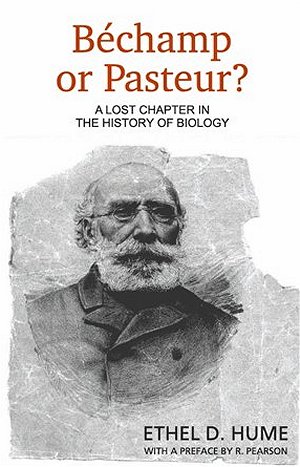My Thoughts On Béchamp Or Pasteur? – A Lost Chapter In The History Of Biology
I have just finished reading a fascinating book that looks at the work of two nineteenth century scientists, Pasteur and Béchamp.
The book is called Béchamp Or Pasteur? – A Lost Chapter In The History Of Biology, and it was written by Ethel Hume.
Most people will, of course, have heard of Louis Pasteur, but few have heard of Antoine Béchamp.
The former has been immortalized in the process named after him that kills bacteria – pasteurization – but it’s his other large claim to fame that is the subject of this book – germ theory.
These two scientists were rivals – and very different personalities.
Béchamp was a thoroughbred scientist, refusing to publish anything until he had the data to back up his statements, and he was far more concerned with this work than with his fame.
Pasteur, on the hand, was all about his reputation, and it’s likely because of this that we now know his name but not that of his rival, Béchamp. (It probably helped that he had the ear of the Emperor, Napoleon III.)
So, back to germ theory.
It was Pasteur’s opinion that human infectious disease and illness was caused by germs, including bacteria and what are now known as viruses.
In other words, each of these germs caused a specific disease, and each disease was caused by a specific germ.
And this is, of course, the view that most of modern science still holds.
Béchamp, on the other hand, went in the other direction – not because it was his opinion or even a hypothesis, but because it was what his experiments showed him. Remember, he was guided by evidence – the hallmark of a true scientist.
His research concluded that there were tiny entities, which he named molecular granulations, or microzymas, that were already within our cells and the true elementary units of life, and that they were responsible for illnesses.
So, instead of disease being the direct result of external pathogenic agents that somehow entered our bodies, it was these microzymas that changed form and function because of exposure to toxins.
This is clearly diametrically opposed to Pasteur’s idea of germ theory – and what’s interesting is that Florence Nightingale, the famous nurse from the Crimean War, had already hinted at the same concept as Béchamp.
This alternative to germ theory is often called terrain theory, and it was initially proposed by Claude Bernard and later developed by Béchamp. This can also explain why some people react differently to disease than others – because the internal state of their bodies is different (i.e. healthier, with fewer or no exposure to toxins)..
Pasteur’s germ theory gave rise to the growing popularity of vaccination, even though his own attempts at creating an anthrax vaccine were far from successful.
It is claimed that, on his deathbed, Pasteur finally acknowledged that his rival, Béchamp, had been right all along.
During his active life, however, it seems as though Pasteur was not a particularly nice or ethical man:
- He didn’t just disagree with Béchamp, he ridiculed him in public.
- He plagiarized Béchamp’s work, claiming it as his own.
Even more interesting is that much of the content of this book was written over 70 years ago.
And while people in general still know little about Béchamp and his work, or how Pasteur’s germ theory is not the robust science we were taught, there is a growing awareness of how cells work and interact, and the importance of our microbiome (i.e. the many colonies of both “good” and “bad” bacteria in our guts), and its connection to our brain.
Conclusion
This book, while a great read, is challenging for a number of reasons:
- There are some reasonably scientific discussions in the book, which requires some careful reading. While all of the precise details do not necessarily have to be fully understood to follow the book’s overall story, there are aspects that should be comprehended (e.g. regarding fements) that are referred to constantly, so it would be worth trying to grasp those concepts.
- A lot of the book is written in an older style of English, which requires a bit more thought than reading modern English does. This especially applies to excerpts from papers presented at the Academy Of Science in Paris.
- The entire subject matter goes against everything that we are taught, not just about Pasteur but about germs and vaccination too. So to read and understand what this book is saying, you need to have an open mind and be willing to throw away what you thought you knew.
What I like about this book are clear timelines, where it can be seen, using actual transcripts of the papers they both wrote), who did, said, and wrote what and when – and Pasteur does not emerge from this as the better man (or scientist).
This book is clearly not for everybody, but I’d like to think that doctors especially, who are taught about germ theory, would be willing to step outside of their comfort zone and take a serious look at an opposing idea that may turn their world upside down.
To me, if germ theory is incorrect, then the repercussions are huge, because that means vaccine science is not only not settled, but perhaps not even science at all.
In fact, if disease is caused by the body’s reaction to being poisoned, then it calls into question many (or most, or all?) pharmaceutical products, because the source of some toxins (e.g. pseudo-foods laced with artificial ingredients, herbicides and pesticides, electricity and electromagnetic radiation) are not going to be classified as bacteria or viruses.
Having said that, there are still aspects of Béchamp’s microzyma theories that I struggle with – such as the existence of outbreaks of a disease. If these diseases (or infections) are internal responses to being poisoned, how is it that infectious diseases appear to spread between people who are close to each other?
So, while Béchamp’s work does make a lot of sense, and I’m pretty sure germ theory is not entirely correct (or even to what extent it might or might not be), I’m still looking to dig deeper on this topic.
Additional Resources
These are suggestions for those who wish to delve deeper into any of the above:








